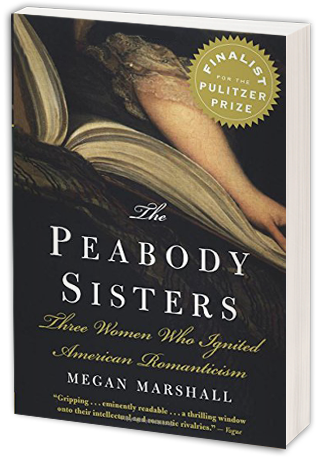|

Articles
20 Years and 5 Editors Later . . .
Arts, Briefly
The Peabody Chronicles
The Other Sister
The Spirit of the Letter
Sophia’s Crimson Hand
The Page 99 Test
Awards
Francis Parkman Prize, awarded by the Society of American Historians for the best-written work of American history published in 2005.
Mark Lynton History Prize, awarded by the Anthony Lukas Prize Project, jointly administered by the Columbia School of Journalism and Harvard’s Nieman Foundation, to the best-written work of history published in 2005.
Pulitzer Prize finalist in biography and memoir, 2006.
Massachusetts Book Award in Nonfiction, 2006. |
The Peabody Sisters:
three women who ignited American romanticism
By Megan Marshall
Praise | Articles | Awards
Elizabeth, Mary, and Sophia Peabody were in many ways our American Brontës. The story of these remarkable sisters—and their central role in shaping the thinking of their day—has never before been fully told. Twenty years in the making, Megan Marshall’s monumental biography brings the era of creative ferment known as American Romanticism to new life.
Elizabeth, the oldest sister, was a mind-on-fire thinker. A powerful influence on the great writers of the era—Emerson, Hawthorne, and Thoreau among them—she also published some of their earliest works. It was Elizabeth who prodded these newly minted Transcendentalists away from Emerson’s individualism and toward a greater connection to others. Mary was a determined and passionate reformer who finally found her soul mate in the great educator Horace Mann. The frail Sophia was a painter who won the admiration of the preeminent society artists of the day. She married Nathaniel Hawthorne—but not before Hawthorne threw the delicate dynamics among the sisters into disarray.
Marshall focuses on the moment when the Peabody sisters made their indelible mark on history. Her unprecedented research into these lives uncovered thousands of letters never read before as well as other previously unmined original sources. The Peabody Sisters casts new light on a legendary American era.
PRAISE
“This beautifully written book is at once an intimate portrait of three remarkable sisters and a study of women’s place in the vibrant intellectual and literary culture of nineteenth century New England. The product of twenty years of research, Megan Marshall’s tour de force is impossible to put down.”
–Drew Gilpin Faust, president, Harvard University “[A] stunning work of biography and intellectual history. Deftly weaving material from the letters and journals of all three sisters, Ms. Marshall, who spent nearly 20 years researching and writing this book, performs the intellectual equivalent of a triple axel. She manages to create vivid portraits of three distinct, and distinctly engaging, personalities, placing them at the center of the seismic disturbances associated with writers like Hawthorne, Emerson and Thoreau. After reading Ms. Marshall, it is impossible to imagine this gallery of American greats without seeing the Peabody sisters in their midst.”
–William Grimes, The New York Times, April 20, 2005 “To write a group biography that also conveys the history of an era and a place is a massive enterprise, one that requires the writer to keep the threads of the story untangled even as the characters’ lives overlap and converge. Marshall, a specialist in New England and women’s history, has done a fine job of organizing and presenting excerpts from the voluminous letters (many of them previously undiscovered) and documents she located in the course of a project that took her almost two decades to complete.”
–Francine Prose, New York Times Sunday Book Review, April 17, 2005 “Marshall’s book is a grand story but also a key contribution to the debate on transcendentalism already engaged by such books as Phyllis Cole’s Mary Moody Emerson and the Origins of Transcendentalism and Joan W. Goodwin’s The Remarkable Mrs. Ripley: The Life of Sarah Alden Bradford Ripley. . . . Marshall and her fellow historians quietly document that the American romantics and transcendentalists were fortunate to live in a society where women were allowed literary expression and metaphysical speculation, and where male and female minds and sensibilities were in free, fruitful communion, even if men could exploit this cultural richness far more easily than women.”
–Gillian Gill, The Washington Post, April 28, 2005 “She shrewdly structures the material and lets readers draw their own conclusions about the emotional complexities that thrived among people living at the edge of cultural possibility. In that sense she encourages our generosity, and our own readerly self-reliance. Skillfully paced and richly observed, The Peabody Sisters is a fascinating, sprawling story that its author commands with finesse.”
–Christine Stansell, The New Republic, October 10, 2005 “The sisters themselves would likely think this book has done them justice. Marshall has greatly increased our understanding of these women and their times in one of the best literary biographies to come along in years, and one that should be a model for how to write a group biography.”
–Joel Myerson, New England Quarterly, September, 2005 |

